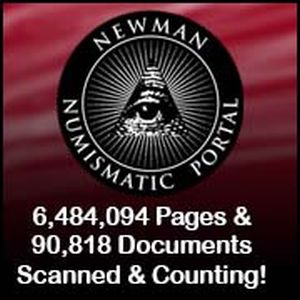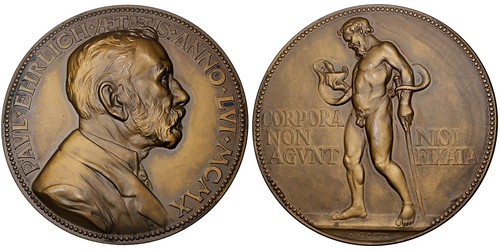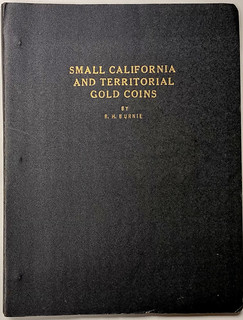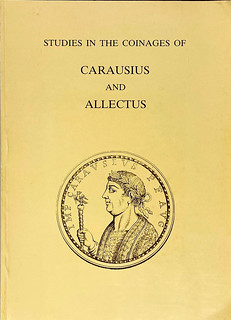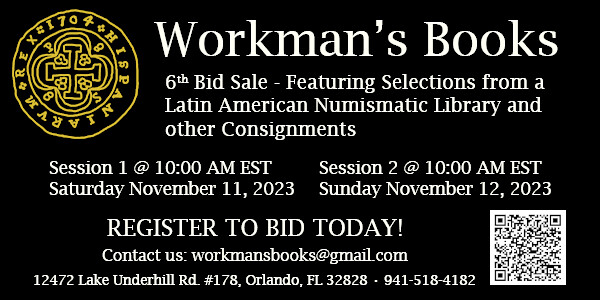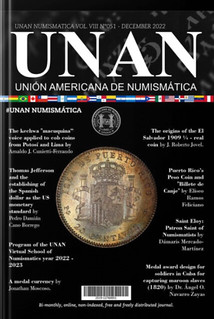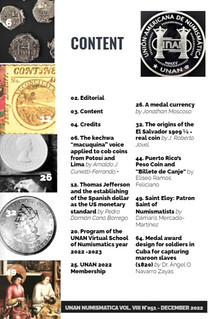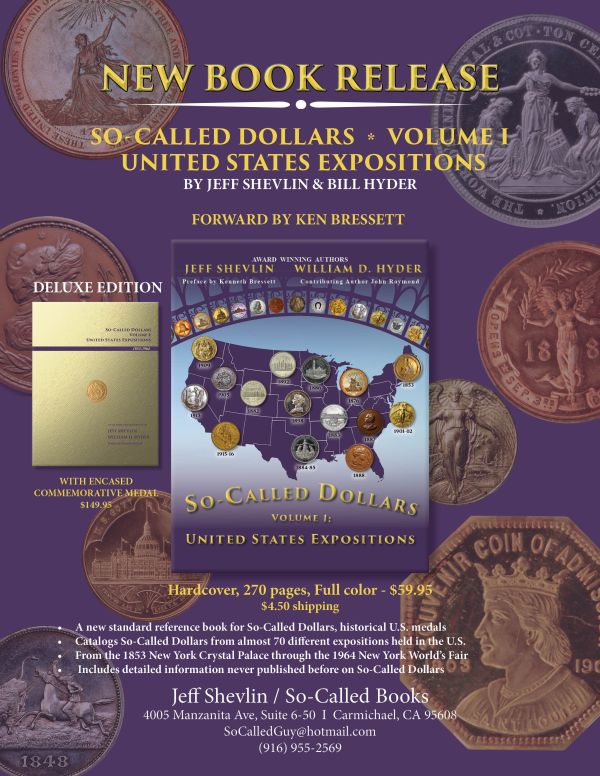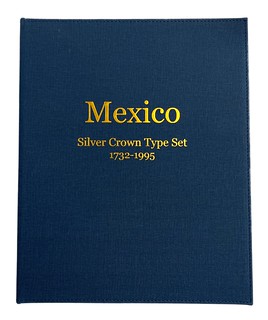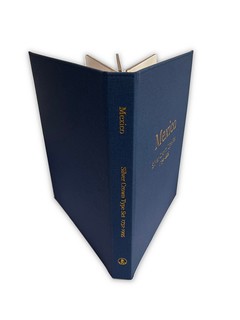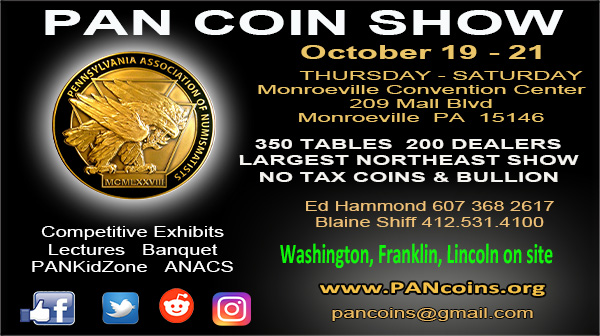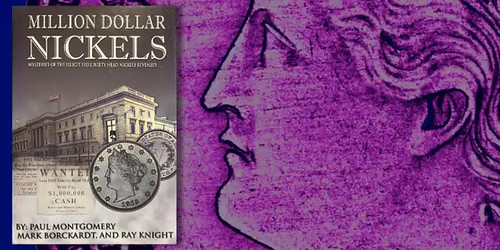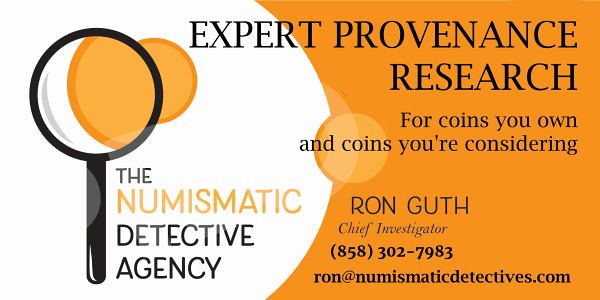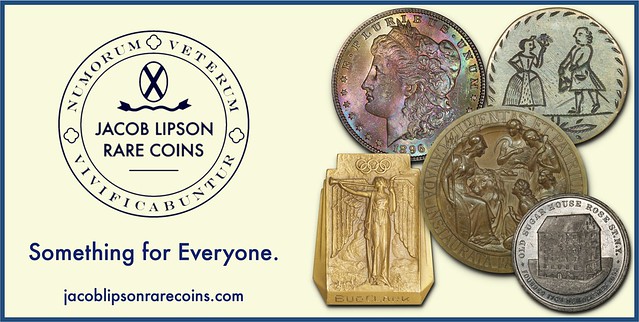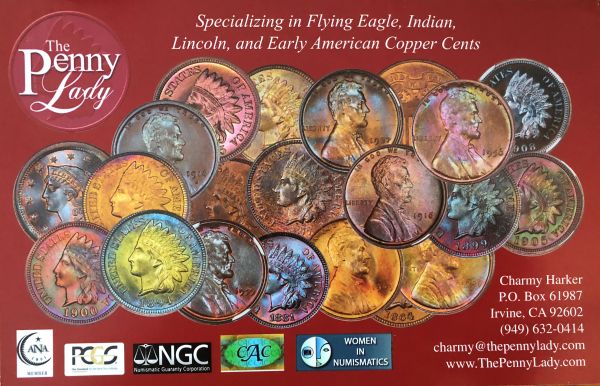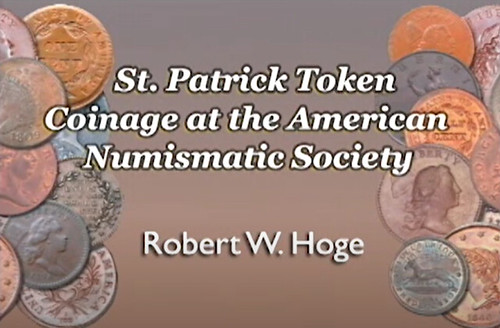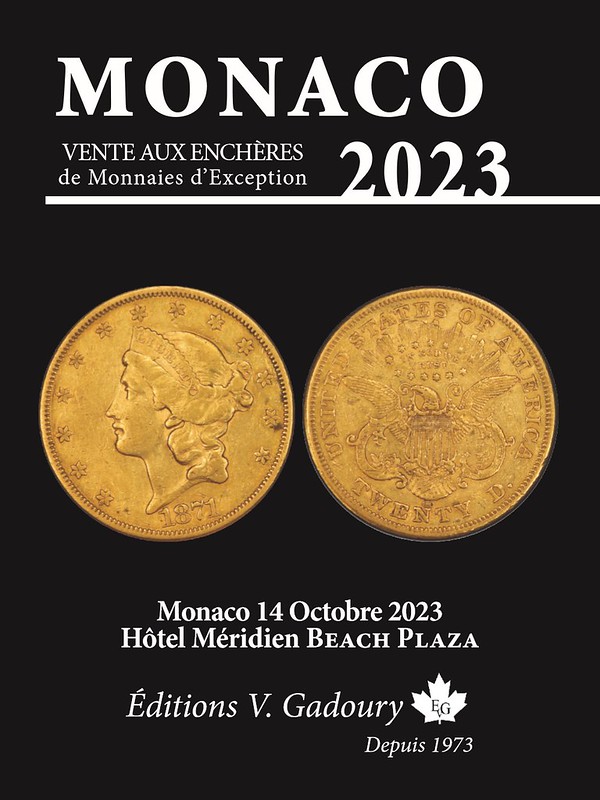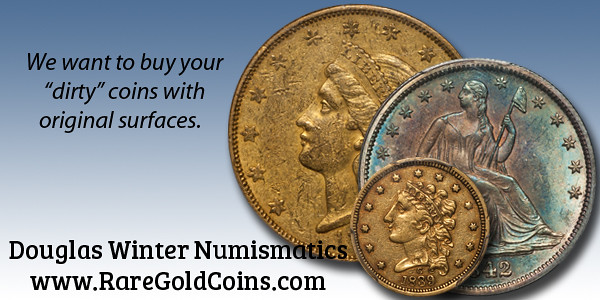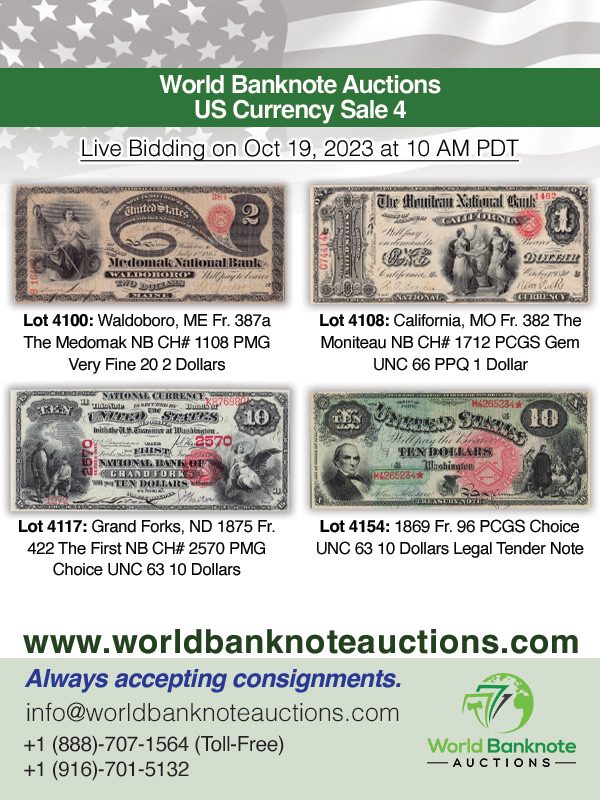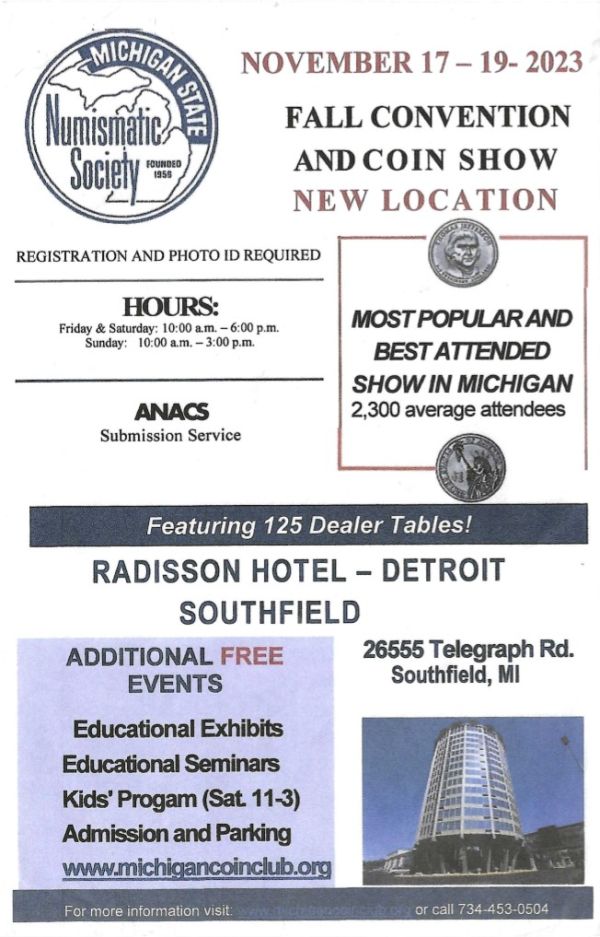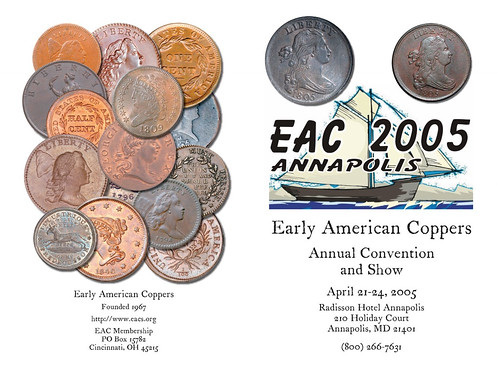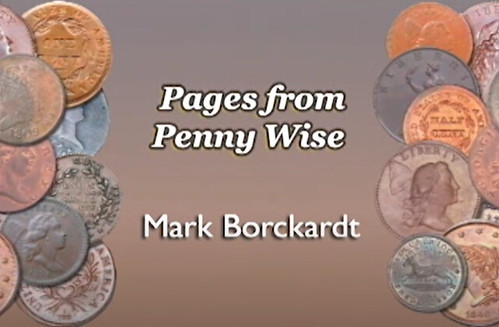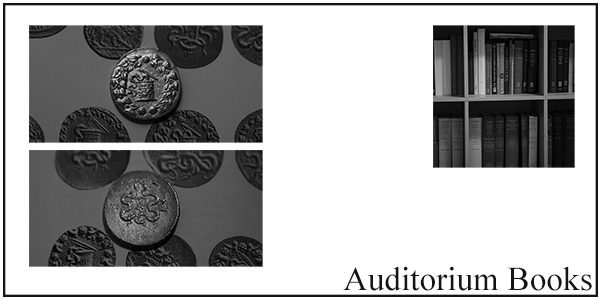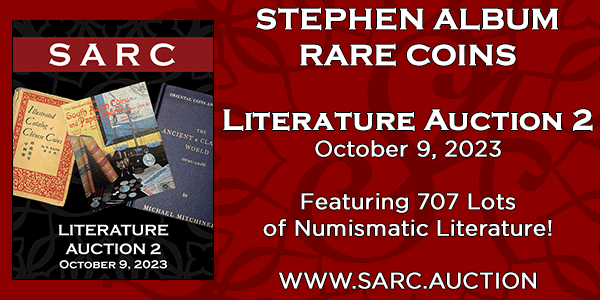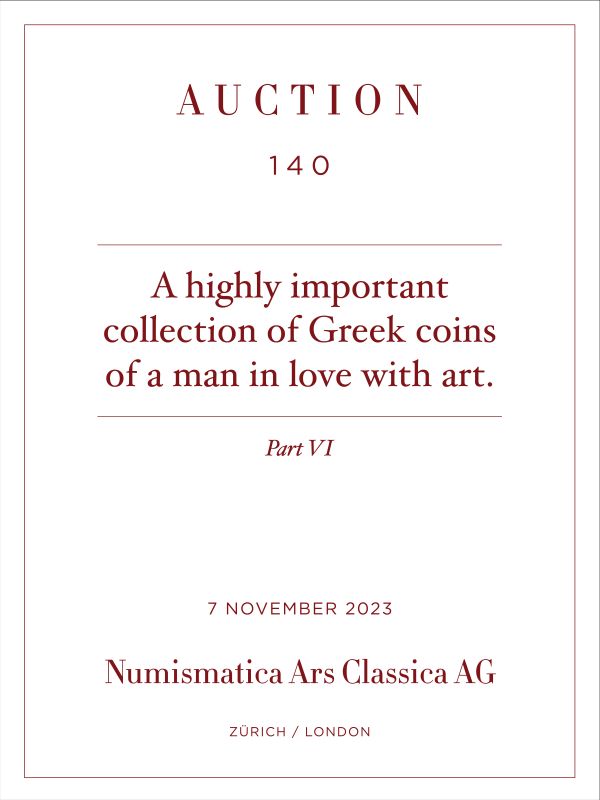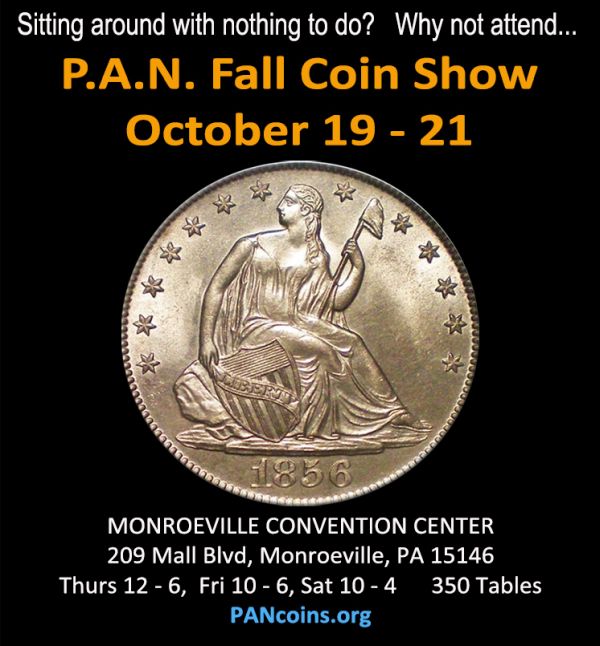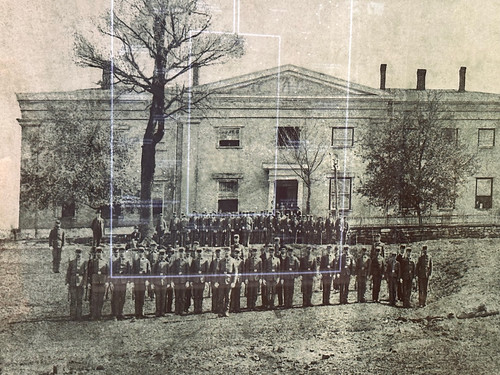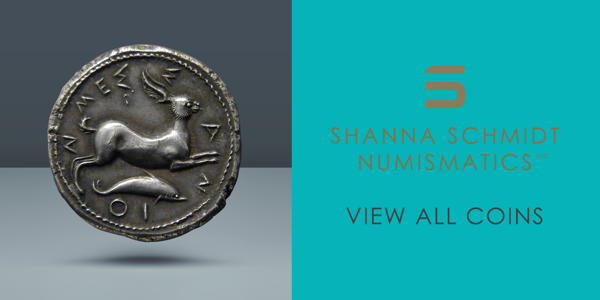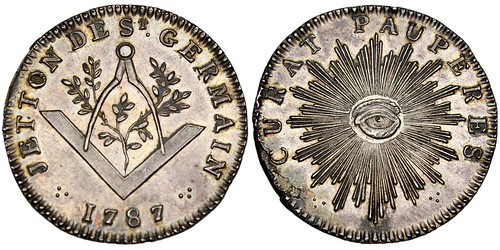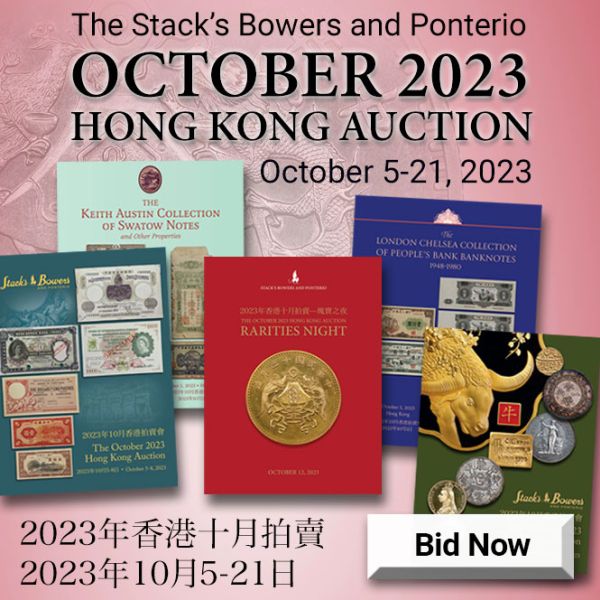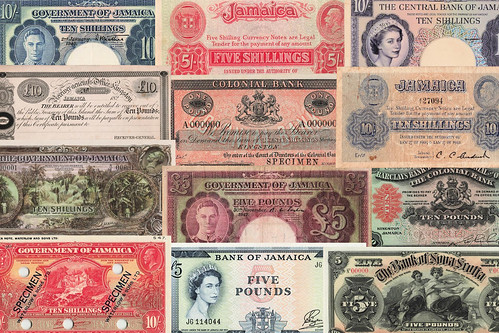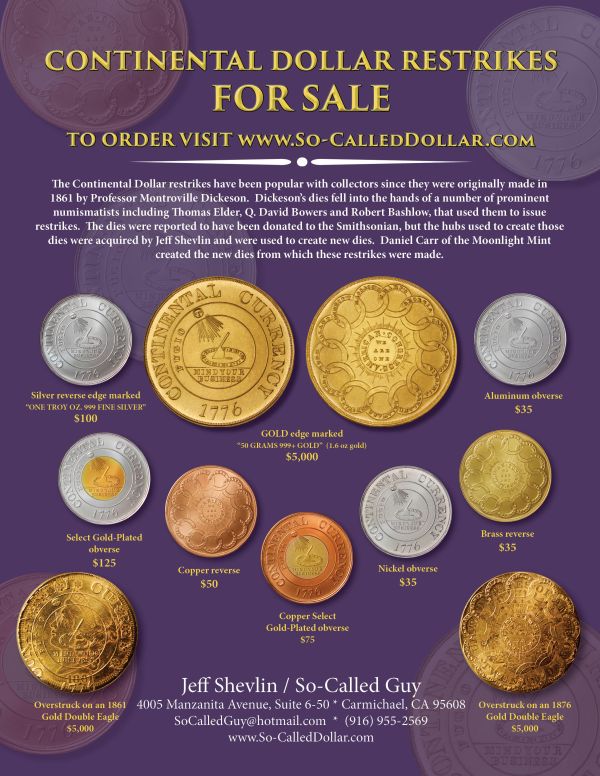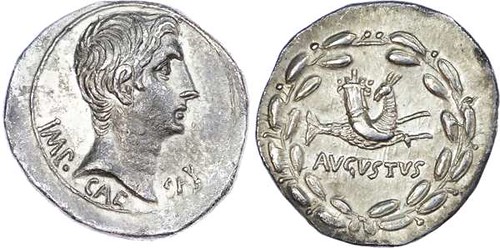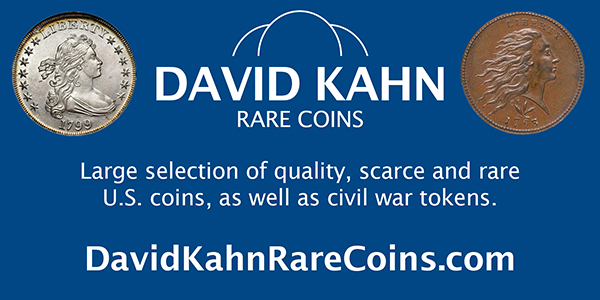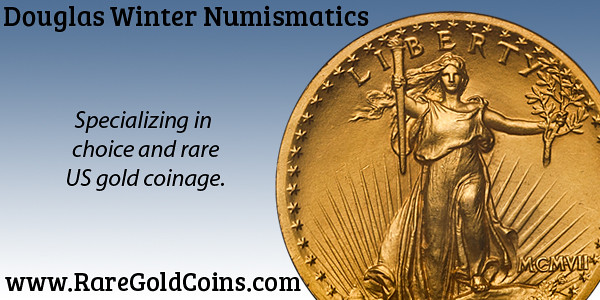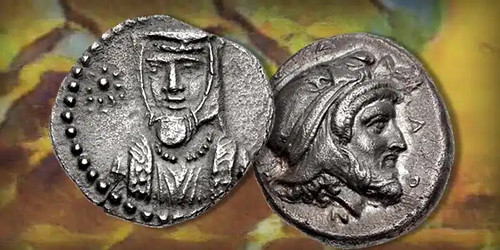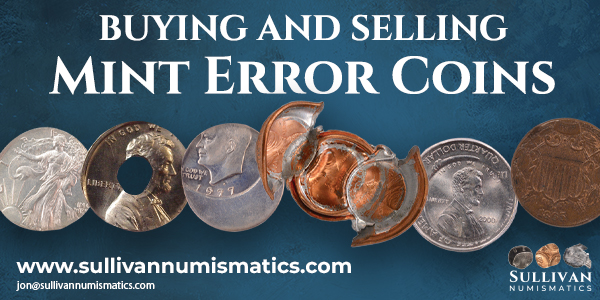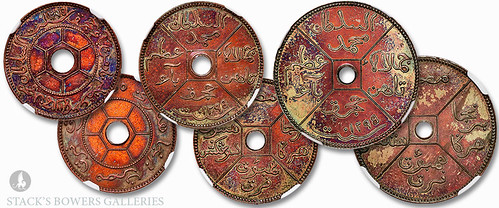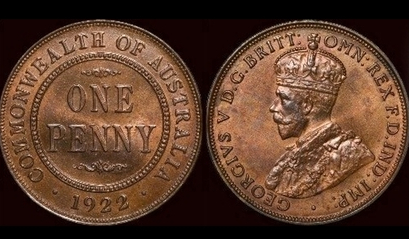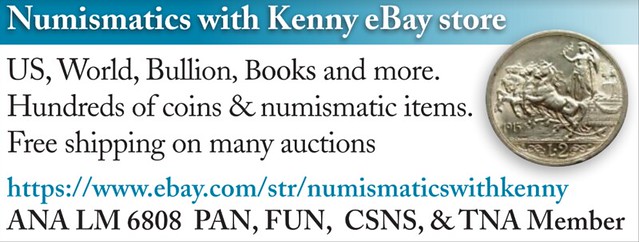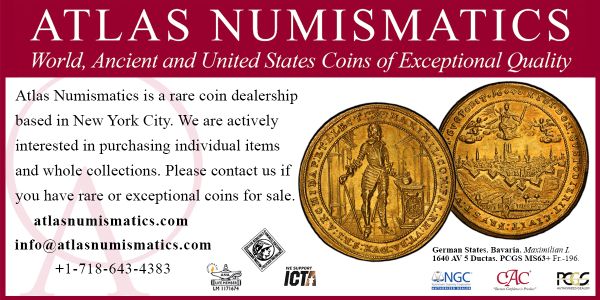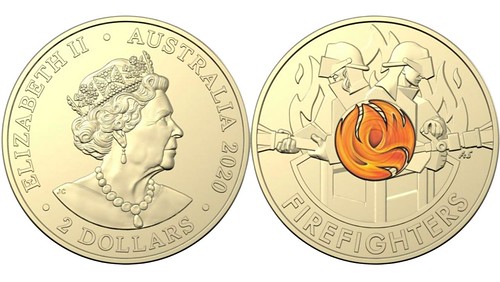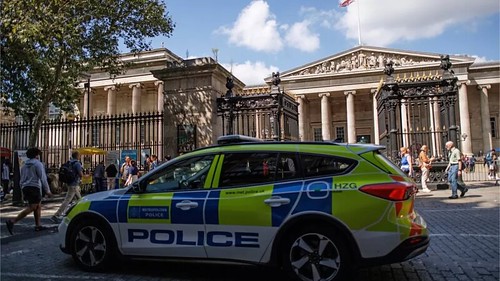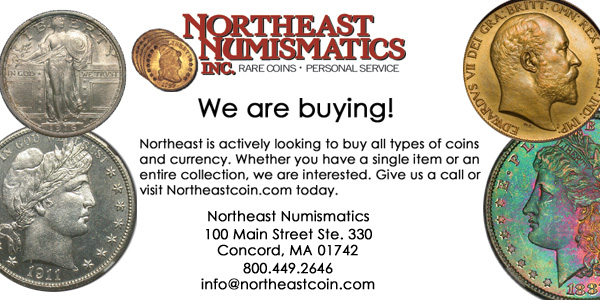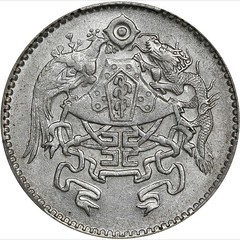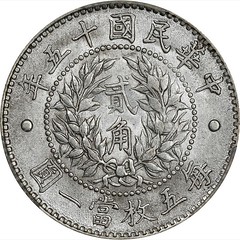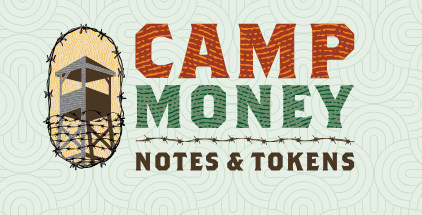
Visit our NBS Sponsors




About UsThe Numismatic Bibliomania Society is a non-profit association devoted to the study and enjoyment of numismatic literature. For more information please see our web site at coinbooks.org SubscriptionsThose wishing to become new E-Sylum subscribers (or wishing to Unsubscribe) can go to the following web page link MembershipThere is a membership application available on the web site Membership Application To join, print the application and return it with your check to the address printed on the application. Print/Digital membership is $40 to addresses in the U.S., and $60 elsewhere. A digital-only membership is available for $25. For those without web access, write to: Jeff Dickerson, Treasurer AsylumFor Asylum mailing address changes and other membership questions, contact Jeff at this email address: treasurer@coinbooks.org SubmissionsTo submit items for publication in The E-Sylum, write to the Editor at this address: whomren@gmail.com BUY THE BOOK BEFORE THE COIN |
- WAYNE'S WORDS: THE E-SYLUM OCTOBER 8, 2023
- STEPHEN ALBUM LITERATURE AUCTION 2 SELECTIONS
- WORKMAN BOOKS SALE 6 ANNOUNCED
- NEW BOOK: CORPUS OF MUGHAL COINS OF INDIA, VOL 1
- PERIODICAL: UNAN DECEMBER 2022
- NEW WORLD COIN ALBUM LINE LAUNCHED
- BOOK REVIEW: MILLION DOLLAR NICKELS
- NOVEMBER 2023 NNP SYMPOSIUM ANNOUNCED
- NEWMAN PORTAL ADDS PHILIPPINE EMERGENCY NOTES
- VIDEO: ST. PATRICK TOKEN COINAGE AT ANS
- RON GILLIO INTERVIEW, PART ONE
- THE NUMISMATIC PROOF SCALE
- SUBSURFACE METAL LATTICE COIN IMAGES
- NOTES FROM E-SYLUM READERS: OCTOBER 8, 2023
- LIBRARY COMPANY FRANKLIN EXHIBIT FEATURES MONEY
- FINANCIAL DOCUMENT EXHIBIT AT IMEX
- VOCABULARY TERM: OFF FLAN
- ALLISON W. JACKMAN
- THE DAHLONEGA GOLD MUSEUM
- NUMISMAGRAM MEDAL SELECTIONS: OCTOBER 8, 2023
- MDC OCTOBER 2023 FRENCH COLLECTION SELECTIONS
- WBNA OFFERS CHANG-MARSHALL JAMAICAN BANKNOTES
- NUMISMATIC NUGGETS: OCTOBER 8, 2023
- ANCIENT COINS OF THE PERSIAN GOVERNORS
- THE SULU PATTERNS OF BRITISH NORTH BORNEO
- THE 1922 AUSTRALIAN SPECIMEN PENNY
- KING CHARLES III TO APPEAR ON AUSTRALIAN COINS
- AUSTRALIA FIREFIGHTER COIN BULLSEYE ERROR
- BRITISH MUSEUM SEEKS RECOVERY OF STOLEN ITEMS
- FRENCH COUPLE SUES DEALER
- LOOSE CHANGE: OCTOBER 8, 2023
- FEATURED WEBSITE: CAMP MONEY NOTES
Content presented in The E-Sylum is not necessarily researched or independently fact-checked, and views expressed do not necessarily represent those of the Numismatic Bibliomania Society.
WAYNE'S WORDS: THE E-SYLUM OCTOBER 8, 2023
 New subscribers this week include:
Denny Polly.
Welcome aboard!
New subscribers this week include:
Denny Polly.
Welcome aboard!
Thank you for reading The E-Sylum. If you enjoy it, please send me the email addresses of friends you think may enjoy it as well and I'll send them a subscription. Contact me at whomren@gmail.com anytime regarding your subscription, or questions, comments or suggestions about our content.
This week we open with two numismatic literature sales, one new book, a new coin album, a book review, updates from the Newman Numismatic Portal, and more.
Other topics this week include Mughal coins of India, St. Patrick coinage, Allison Jackman, Ron Gillio, Paul Ehrlich, the numismatic proof scale, Ben Franklin's currency printing plates, IMEX, Dahlonega gold, Jamaican banknotes, Australian coins and errors, and camp money.
To learn more about small California and Territorial gold coins, Ferdinand II Tyrolean Thalers, 1913 Liberty Head nickels, Philippine Emergency Notes, subsurface metal lattice images, NumiStudy, the motto "We Shall Persevere", coins of the Persian Governors, a rather inappropriate bullseye symbol and a famous pneumismatist, read on. Have a great week, everyone!
Wayne Homren
Editor, The E-Sylum
STEPHEN ALBUM LITERATURE AUCTION 2 SELECTIONS
Stephen Album Rare Coins is holding their second numismatic literature auction on October 9, 2023. Here are some additional lot selections. -Editor
Lot 98: Burnie, R. H., Small California And Territorial Gold Coins: Quarter Dollars, Half Dollars, Dollars, First Edition, Pascagoula, 1955, 96 pages, softcover three-ring bound. Contains an introduction, a short essay called "Notes on the Small California Gold Coinage" and many descriptions of coin types.
Lot 106: Challis, M.A.S. and C.E. Blackburn, Studies in the coinages of Carausius and Allectus, British Numismatic Society, London, 1985, 50 pages including 5 plates, softcover, ex Libris Stephen Huston.
WORKMAN BOOKS SALE 6 ANNOUNCED
Alan Workman has a numismatic literature sale closing November 11-12, 2023. Here's the announcement and some selected lots. -Editor
Workman's Books is conducting its Sixth sale, "Sale 6 - Selections from A Latin American Numismatic Library and other Consignments.". Accompanying the Latin American Numismatic Library is a sizeable consignment of books, catalogs, magazines, journals, and dealer fixed price lists on numismatics, orders & decorations, militaria, shipwrecks, sunken treasure, lost treasure, treasure hunting, lost mines, and treasure in the American West.
SESSION 1:
- Books: 1 to 467
- Auction Catalogs & Dealer Fixed Pricelists: 468 to 734
SESSION 2:
- Auction Catalogs & Dealer Fixed Pricelists: 735 to 1267
- Journals & Magazines: 1268 to 1345
- Posters: 1346
- Newspapers: Lot 1347
- Photos: 1348 to 1349
- Postcards: 1350 to 1351
- VHS Tapes: 1352 to 1354
- DVDs: 1355
NEW BOOK: CORPUS OF MUGHAL COINS OF INDIA, VOL 1
Volume 1 in a series of books on the Mughal Coins of India has been published. -Editor
Corpus of Mughal Coins of India, Volume 1: Silver & Gold Coins in the names of Babur, Humayun, Kamran and Akbar 1526-1605
Nilesh Gada (Author)
Dilip Rajgor (Author)
Legacy of India
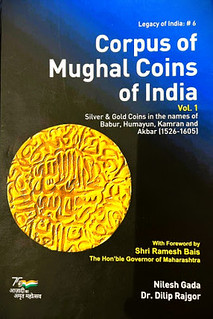 The Corpus of Mughal Coins of India is a series of six volumes. The Corpus deals with all the coins issued by the Mughal Emperors within modern countries of India, Pakistan, Afghanistan, Uzbekistan, Nepal & Bangladesh. These coins include not only all the coins issued by the Mughal Emperors, but also all the coins issued by provincial rulers in the name and style of these Mughal Emperors. These include Independent Kingdoms, Princely States and East India Company. Catalogue of Mughal coins is classified as per chronology of Mughal Emperors. Each volume of the present series includes several rulers and their respective coins. A table of the classification of all the coins of these Mughal coins is appended hereunder.
The Corpus of Mughal Coins of India is a series of six volumes. The Corpus deals with all the coins issued by the Mughal Emperors within modern countries of India, Pakistan, Afghanistan, Uzbekistan, Nepal & Bangladesh. These coins include not only all the coins issued by the Mughal Emperors, but also all the coins issued by provincial rulers in the name and style of these Mughal Emperors. These include Independent Kingdoms, Princely States and East India Company. Catalogue of Mughal coins is classified as per chronology of Mughal Emperors. Each volume of the present series includes several rulers and their respective coins. A table of the classification of all the coins of these Mughal coins is appended hereunder.
THE BOOK BAZARRE
PERIODICAL: UNAN DECEMBER 2022
The December 2022 issue of UNAN from the Union Americana de Numismatica (American Numismatic Union) has been published. -Editor
NEW WORLD COIN ALBUM LINE LAUNCHED
International Fine Objects has launched a new range of coin albums, starting with one for Mexican Crowns. It's great to see a new entrant in this important niche of numismatic publishing. -Editor
International Fine Objects presents - World Coin Albums! After decades out of print, we are now manufacturing coin albums for collectors. The first available is a Silver Crown Type Set of Mexico, featuring many innovations:
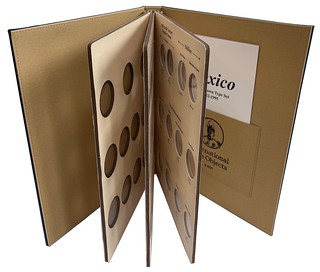
- Slots for 35 different type crowns from from 1732 to 1995
- Safe EVF foam gaskets for irregularly sized colonial 8 reales and republic pesos
- A beautiful, hardcover, two-tone blue/cream cloth-bound folder with gold lettering
- Archival-safe, acid-free, PVC-free construction
- Pocket with logbook full of background history and checkboxes for the collector to record provenance
BOOK REVIEW: MILLION DOLLAR NICKELS
CoinWeek published a review of the 2005 book Million Dollar Nickels by Paul Montgomery, Mark Borckardt and Ray Knight. Here's an excerpt - see the complete article online for more. -Editor
The 1913 Liberty Head nickel is one of the most valuable and famous of all United States coins. Produced in secrecy and without official authorization in either late 1912 or early 1913, the coin is the last to bear the Liberty Head design created by United States Mint Chief Engraver Charles Barber design. Coin collectors became aware of its existence in 1919 when Mint employee Samuel Brown showed the nickels at a Chicago Coin Club meeting. Shortly before doing this, Brown had placed an ad in The Numismatist claiming that he was willing to pay $500 each for 1913 nickels. This was an enormous sum for a civil servant at the time but the ruse worked, and all five nickels were purchased by Colonel E.H.R. Green.
NOVEMBER 2023 NNP SYMPOSIUM ANNOUNCED
The NNP Symposia are highlights of the numismatic year, bringing great speakers direct to you via Zoom. Be sure to plan for the next one. Here's the announcement. -Editor
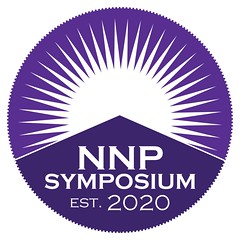 The Newman Numismatic Portal today announces the next NNP Symposium, which
will take place November 2-4. This is a free, online event that brings together a variety of numismatic
speakers and covers a wide array of numismatic subjects. Featuring approximately 30 presentations,
attendees will easily find topics of interest. This is the seventh such event, which was launched in fall
2020 in response to the pandemic.
The Newman Numismatic Portal today announces the next NNP Symposium, which
will take place November 2-4. This is a free, online event that brings together a variety of numismatic
speakers and covers a wide array of numismatic subjects. Featuring approximately 30 presentations,
attendees will easily find topics of interest. This is the seventh such event, which was launched in fall
2020 in response to the pandemic.
In the area of U.S. numismatics, our feature presentation will cover U.S. material in the cabinet of the American Numismatic Association (ANA). Beginning with the 1804 dollar and 1913 Liberty nickel, the ANA collection includes important items in multiple areas of U.S. numismatics. Doug Mudd, the ANA Curator, will be on hand to answer audience questions following this presentation.
NEWMAN PORTAL ADDS PHILIPPINE EMERGENCY NOTES
The latest addition to the Newman Numismatic Portal is the first edition of Philippine Emergency Notes by Ken Berger. Project Coordinator Len Augsburger provided the following report. -Editor
Newman Portal Adds Philippine Emergency Notes
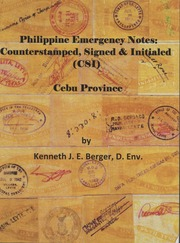 Through the courtesy of author Kenneth J. E. Berger, the first (2016) edition of the volume Philippine Emergency Notes : Counterstamped, Signed & Initialed (CSI) Cebu Province is available on Newman Portal. Following the December 1941 Japanese attacks on Hawaii and the Philippines, increased government expenditures and public hoarding created a need for emergency money, which was authorized by the Philippine government in late 1941. Berger's work focuses on the counterstamped, signed, and initialed notes issued by the Philippine Central Bank in the Cebu region. An addendum to the work, also available on Newman Portal, supplies color illustrations of many of the Cebu notes.
Through the courtesy of author Kenneth J. E. Berger, the first (2016) edition of the volume Philippine Emergency Notes : Counterstamped, Signed & Initialed (CSI) Cebu Province is available on Newman Portal. Following the December 1941 Japanese attacks on Hawaii and the Philippines, increased government expenditures and public hoarding created a need for emergency money, which was authorized by the Philippine government in late 1941. Berger's work focuses on the counterstamped, signed, and initialed notes issued by the Philippine Central Bank in the Cebu region. An addendum to the work, also available on Newman Portal, supplies color illustrations of many of the Cebu notes.
Link to Philippine Emergency Notes : Counterstamped, Signed & Initialed (CSI) Cebu Province on Newman Portal:
https://nnp.wustl.edu/library/book/632256
VIDEO: ST. PATRICK TOKEN COINAGE AT ANS
The David Lisot Video Library on the Newman Numismatic Portal can be found at:
https://nnp.wustl.edu/library/multimediadetail/522852
We highlight one of his videos each week in The E-Sylum. Here's one from 2007 where ANS Curator Robert Hoge talks about St. Patrick tokens. -Editor
RON GILLIO INTERVIEW, PART ONE
Greg Bennick's latest interview for the Newman Numismatic Portal is with longtime dealer Ron Gillio.
Ron talked about his history in the coin hobby, his experiences traveling overseas to purchase gold coins, the early days of the Long Beach coin show, and interesting topics such as the American Institute of Professional Numismatists
that he started with Walter Breen.
Here's the first of five parts, where Ron talks about his start in collecting. -Editor
GREG BENNICK: Hi, everybody. My name is Greg Bennick. I'm with the Newman Numismatic Portal, and this is yet another in a series of interviews with numismatists from a wide range of backgrounds. And today I'm with Ron Gillio, and we're going to be talking about his career, his background, and how he got his start in numismatics. And I'm really excited for this conversation. Ron, hi, how are you today?
RON GILLIO: Greg, I'm fine. This is a great opportunity to tell my story, and thanks for contacting me, and I'm very excited about doing this with you.
GREG BENNICK: I'm so glad. And for viewers, Ron has been very patient. We actually set this up two weeks ago, and just as we started the interview, my laptop died. And when I say died, I don't mean that the battery went out. I mean, like into Apple for serious repairs and the whole nine yards. So, Ron has been most patient and most gracious. And Ron, I really appreciate that. Thank you so much.
RON GILLIO: No problem.
GREG BENNICK: Great. Well, tell me, how did you get your start in the hobby? What got you interested in coins?
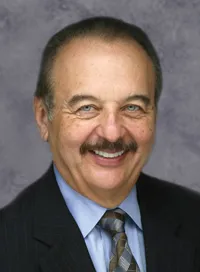 RON GILLIO: Well, it goes back to 1959. In 1959, I was at a movie theater in line.
I bought my ticket, I got change. And when I looked at my change, there were some
really shiny pennies in my change. And I had been looking at coins. I was always
interested in kind of looking at coins. And I noticed that it was different from some
of the other older pennies that were in the same change I got. Of course, it was the
new Lincoln Memorial penny. And I was very curious about it. I lived at the time in
the San Fernando Valley in Sherman Oaks, California.
RON GILLIO: Well, it goes back to 1959. In 1959, I was at a movie theater in line.
I bought my ticket, I got change. And when I looked at my change, there were some
really shiny pennies in my change. And I had been looking at coins. I was always
interested in kind of looking at coins. And I noticed that it was different from some
of the other older pennies that were in the same change I got. Of course, it was the
new Lincoln Memorial penny. And I was very curious about it. I lived at the time in
the San Fernando Valley in Sherman Oaks, California.
And there was a coin dealer I found just around the corner almost from the theater,
Bert Doling. And he was kind of my mentor that I went and talked to him. And he
said, Yes, it's a new penny, you should buy some of these and keep them.
So, I
bought two rolls of 1959 Philadelphia pennies. He said, You get the Denvers at the
bank, but these are better so get the Philadelphia's.
And that's what kind of got me
started.
THE NUMISMATIC PROOF SCALE
Jerry Nashorn submitted these thoughts on numismatic collecting and research inspired by Greg Bennick's interview with Bill Groom. Thank you! -Editor
I very much enjoyed reading Bill Groom's interview concerning counterstamps which is packed with information and sound insights. I think he's hit the nail on the head with his skepticism about many of the attributions contained in reference books, auction catalogs, and online auctions and price lists. And the "proof scale" discussed in Part 4 is a major contribution. The schema he has developed makes a lot of sense. They also would be of use when dealing with other types of numismatic material, such as maverick merchant tokens and award medals inscribed with the recipient's name where an absolutely certain attribution is often not possible. Of course, when dealing with inscribed award medals and merchants' tokens, most would fall into the 2-4 category while a large fraction of counterstamps, even after diligent research, would probably remain 0's or 1's.
SUBSURFACE METAL LATTICE COIN IMAGES
Rob Rodriguez submitted this summary and link to his recent American Numismatic Society lecture. Thank you! Great images. -Editor
New Groundbreaking Scientific Technique Unlocks Mysteries of a 1792 Judd-9 Silver Disme
By Robert Rodriguez
At the 2023 ANS Coinage of the Americas Conference, I presented, History Recovered: Saga of the 1792 Silver Disme,
on September 22.
As a result of our investigations, my colleague, Tony Lopez, and I conclude that the following 1792 Judd-9 silver disme is the Design Work
Surface that was used to design the 1793 half cent. To arrive at this conclusion, our journey of discovery required the most extensive and
intensive scientific investigation ever conducted in the field of numismatics that took place over a period of nearly 4 1/2 years.
NOTES FROM E-SYLUM READERS: OCTOBER 8, 2023
Second Life for the 2005 EAC Convention Brochure
Bill Eckberg writes:
"Every time I see one of David's videos on early copper on The E-Sylum, I have to laugh. His logo at the introductions is made up of (mostly) early copper coins in a pile.
"He didn't create that. It served as the back cover that I had created for the 2005 Annapolis EAC convention brochure. He cut it in half along the middle and used the right half for the left side and the left half for the right side of his title pages.
"When I saw him later, I asked him if he was aware that he had usurped (I didn't use that word; I just like it) copyrighted material without attribution. After he blanched noticeably, I told him he had permission henceforth to use it for free. He relaxed and kept using the image for as long as he did videos at EAC shows.
"Here is an image of the original brochure cover. The boat image came from Red Henry, and about six of the coins on the reverse were from my own collection at the time; the rest were used with permission from auction companies. It's always a joy to see the old friends in the videos and old copper friends in the introductions to the videos."
Great story! Thanks. Nice work on the brochure - no wonder it saw new life. Great coins. -Editor
To read the earlier E-Sylum article, see:
VIDEO: MARK BORCKARDT AND PENNY WISE
(https://www.coinbooks.org/v26/esylum_v26n40a10.html)
Other topics this week include NumiStudy, AI-Generated Numismatic Images, and damaged money. -Editor
LIBRARY COMPANY FRANKLIN EXHIBIT FEATURES MONEY
Ray Williams contributed to a new exhibit at the Library Company of Philadelphia, which includes original printing blocks used to produce Franklin & Hall Delaware Currency. Check it out if you're in the area. -Editor
Ray writes:
"I wanted to make everyone aware that there is an exhibit honoring some of Franklin's contributions to numismatics, including three printing blocks used to print colonial currency. One of the blocks is Franklin's nature print! The timing coincides with the 300th anniversary of Franklin crossing the Delaware into Philadelphia after which the city, colony and country would never be the same. Who knows when the next opportunity will be to view these items?
The exhibit is at the Library Company of Philadelphia, founded by Franklin in 1731, and will be on display thru the end of the year. The possibilities for numismatic research at this library is endless. Dr. Jessica Linker was instrumental in selecting items for the exhibit and writing the text describing the contents."
New Exhibit Opening
THE BOOK BAZARRE
How lucky we are to share in Rendell's passion,writes Doris Kearns Goodwin in the book's foreword. Order your copy online at Whitman.com , or call 1-800-546-2995.
FINANCIAL DOCUMENT EXHIBIT AT IMEX
The Museum of American Finance will exhibit some of its treasures at the upcoming IMEX show in Nashville. Here's the press release. -Editor
The Museum of American Finance, an affiliate of the Smithsonian Institution based in New York, has been invited to display some of the most important documents from its world-class collection at the first annual International Money Exposition (IMEX) in Nashville, TN, from October 27-28, 2023. IMEX is a global money show that is expected to attract more than 350 dealers and thousands of attendees from around the world.
 As part of its mission to preserve and present the history and practice of finance in the United States,
the Museum actively collects important documents and artifacts related to the capital markets,
money, banking and free enterprise. The archive houses thousands of documents, certificates and
examples of currency, including the nation's premier collection of 18th century US financial
documents, as well as artifacts ranging from vintage stock tickers to Wall Street memorabilia. The
collection also includes photographs, prints, books and periodicals pertaining to the history of finance,
business and economics.
As part of its mission to preserve and present the history and practice of finance in the United States,
the Museum actively collects important documents and artifacts related to the capital markets,
money, banking and free enterprise. The archive houses thousands of documents, certificates and
examples of currency, including the nation's premier collection of 18th century US financial
documents, as well as artifacts ranging from vintage stock tickers to Wall Street memorabilia. The
collection also includes photographs, prints, books and periodicals pertaining to the history of finance,
business and economics.
VOCABULARY TERM: OFF FLAN
Here's another entry from Dick Johnson's Encyclopedia of Coin and Medal Terminology. -Editor
Off Flan. Design or lettering not appearing on a struck piece because a smaller than intended planchet was used to strike the piece. The design or lettering is in the die and intended to appear in the struck piece, but too small a diameter blank was used. Obviously, this missing detail is near the edge of the struck piece. The missing portion of the design or lettering is said to be off flan. The 1791 Liverpool Halfpenny bearing George Washington's portrait and intended for circulation in America were all struck on too small a planchet with parts of lettering in the legend off flan (Breen 1223).
ALLISON W. JACKMAN
E-Sylum Feature Writer and American Numismatic Biographies author Pete Smith submitted this article on collector Allison Jackman. Thanks! -Editor
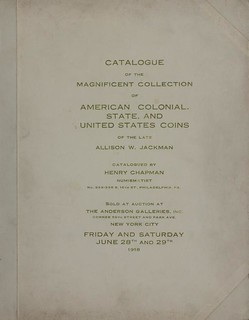 I first came across the name of Allison Jackman while doing research for a 1986 book. That was
long before the Newman Numismatic Portal and I needed to find an actual physical copy of the
1918 Henry Chapman sale of his collection. The catalog had a memorable description:
I first came across the name of Allison Jackman while doing research for a 1986 book. That was
long before the Newman Numismatic Portal and I needed to find an actual physical copy of the
1918 Henry Chapman sale of his collection. The catalog had a memorable description:
Mr. Allison W. Jackman was a highly educated gentleman who devoted his life to study, having
never engaged in business, and being a most devoted son with an equally appreciative mother,
his collecting was a pleasure to both of them.
This week I set out to see what else I could learn about him.
Allison Jackman was born in Pennsylvania in 1849, the son of David Kilbourne Jackman and
Saraphina P. Ross. For the 1850 Census, David was a merchant in Lock Haven, Pennsylvania.
The 1860 Census is interesting in that it lists the father as a gentleman
and his son as Albisa
in an apparent misinterpretation of the handwriting. The family was still living in Loch Haven,
Pennsylvania. For the 1870 Census, David was listed as a farmer living in Bath, New Hampshire.
THE DAHLONEGA GOLD MUSEUM
In an October 5, 2023 email to clients, John Brush of David Lawrence Rare Coins published a report from his recent visit to the Dahlonega Gold Museum. -Editor
On Friday afternoon, I found myself wandering through the lovely downtown of Dahlonega, Georgia. For those of you who have never visited the small gold rush town in North Georgia, I highly encourage you to visit. It's a quaint town with restaurants, antique shops, and a classic downtown city hall which now houses the Georgia Gold Rush Museum.
NUMISMAGRAM MEDAL SELECTIONS: OCTOBER 8, 2023
Jeremy Bostwick at Numismagram passed along these four tokens and medals from his most recent upload of new material to his site. For all of the new items, please visit https://www.numismagram.com/inventory. -Editor
102353 | FRANCE. Lodge of Saint Germain silver Jeton. Issued 1787 (23mm, 3.74 g, 6h). JETTON DE ST. GERMAIN, compass, square, and acacia sprays // CURAT PAUPERES ([He] looks out for the poor), radiant Eye of Providence. Edge: Reeded. Labouret 448. PCGS MS-62. Lightly toned, with great brilliance; a minor planchet flaw near the edge of the reverse is noted for completeness. Fairly rare and interesting. $645.
Contemporaneous to the "first coins" of the United States, the Nova Constellatio coppers of 1783, this silver masonic issue from the Lodge of Saint Germain in France was struck just four years later, possibly inspired by the "all-seeing eye" iconography as seen on the Nova Constellatio coppers.
To read the complete item description, see:
102353 | FRANCE. Lodge of Saint Germain silver Jeton.
(https://www.numismagram.com/product-page/102353)
MDC OCTOBER 2023 FRENCH COLLECTION SELECTIONS
Here are some final selections from The French Collection offered in this month's MDC Monaco Auction No. 12. -Editor
presented by MDC Monnaises de Collection
Auction October 11, 2023
MDC Monnaies de collection is excited to auction The French Collection
in October 2023.
The collection of 540 lots, built over 40 years, includes the most beautiful coins from the
French Revolution to the Fifth Republic, with a vast majority of Top Pop. Today, it is not
possible to recreate such a collection. We know that many collectors will find in it the special
coins they have been looking for. The auction will take place in Monaco at the Hôtel Métropole on the 11th of October 2023, from 1:30 pm to 4 pm (lots 1 to 296) and from 4:15
pm to 7 pm (lots 297 to 540), Nicolas Gimbert, Auctioneer.
To view the complete collection:
https://mdc.mc/auction/vente-aux-encheres-numismatique-12/
WBNA OFFERS CHANG-MARSHALL JAMAICAN BANKNOTES
On November 3rd World Banknote Auctions will sell a landmark collection of Jamaican banknotes. Here's the announcement. -Editor
Ian Marshall Collection of Jamaican Banknotes
World Banknote Auctions is thrilled to announce its upcoming auction of the Isabella Chang Fong & Ian Marshall Collection of Jamaican Banknotes, a remarkable and unrivaled assembly of Jamaican currency. This collection, widely regarded as arguably the most extensive and specialized assortment of Jamaican banknotes of the Sterling era ever put together, will be sold to collectors and enthusiasts worldwide by World Banknote Auctions on November 3rd, 2023, at 10 AM PST.
NUMISMATIC NUGGETS: OCTOBER 8, 2023
Here's a selection of interesting or unusual items I came across in the marketplace this week. Tell us what you think of some of these. -Editor
An Augustus Cistophorus
Augustus (27 BC – AD 14) AR Cistophorus, Ephesus, 11.76g. IMP CAE-SAR, bare head of Augustus right. Rev. AVGVSTVS, Capricorn right, cornucopiae before. (RIC 477; RPC 2213). Good Very Fine.
From Baldwin's Auction 113. -Editor
To read the complete lot description, see:
Augustus (27 BC – AD 14) AR Cistophorus, Ephesus, 11.76g.
(https://thestrand.com/auctions/calendar/list#/lots/78349de7-ce29-48c3-a38c-bafa8842b641)
Other topics this week include an 1863 Union Volunteer Refreshment Saloon Token, and a 1942 Five Shilling Internment Token. -Editor
ANCIENT COINS OF THE PERSIAN GOVERNORS
Mike Markowitz published another article in his CoinWeek Ancient Coin Series on "Ancient Coins of the Persian Governors." Here's an excerpt - see the complete article online. -Editor
THE ACHAEMENID EMPIRE of Persia founded by Cyrus the Great (ruled 559-530 BCE) was eventually conquered (330 BCE) by Alexander the Great. Achaemenid kings ruled their vast, multi-ethnic state through a system of appointed governors or satraps, recruited mainly from a narrow elite of closely related Iranian families. Satrap
is the Greek reading of the Old Persian word khshathapavan, meaning protector of the province
. As the Persians gained control over regions inhabited by Greek-speakers, these governors issued Greek-style coinage in their own names, and even bearing their individual images. These were some of the earliest coins to bear portraits of living persons, and are of great historic interest to collectors.
An important visual element in the depiction of satraps was their distinctive headgear, the kyrbasia[1], a sort of loose hood with long ear flaps. But some satrap portraits are bareheaded, perhaps a concession to the customs of their Greek subjects.
THE SULU PATTERNS OF BRITISH NORTH BORNEO
An article by Stack's Bowers Senior Numismatist Kyle Ponterio discusses the 1878 British North Borneo patterns produced by the Birmingham Mint. -Editor
Our October 2023 Hong Kong auction contains many special numismatic treasures from all over Asia including a British North Borneo Pattern denomination set produced by the Birmingham Mint in 1878. Included are:
- Lot # 33436 – Copper Cent Pattern, AH 1295 (1878)
- Lot # 33440 – Copper 1/2 Cent Pattern, AH 1295 (1887)
- Lot # 33441 – Copper 1/4 Cent Pattern, AH 1295 (1887).
THE 1922 AUSTRALIAN SPECIMEN PENNY
Andrew Crellin of Sterling & Currency published this well-researched article on the Australian 1922 Specimen Penny, one of the very first copper coins struck at the Perth Mint. Here's a short excerpt - see the complete article online for more. -Editor
Further batches of penny dies were sent to the Perth Mint from both the Melbourne Mint and the Royal Mint in London throughout 1922, these allowed the Perth Mint to strike 1922-dated pennies right up until February 1923.
The total number of pennies struck by the Perth Mint during this period came to £15,110, or approximately 3,626,400 coins. The amount distributed locally in Perth ranged between £50 per month and £640 per month, which clearly shows that the vast majority of the pennies struck by the Perth Mint during this period (£10,000 out of £15,110, or around 66% of total production) were shipped to the Commonwealth Sub-Treasury in Sydney for circulation on the Eastern seaboard. The demand for pence by the local banks in Perth prior to 1921 was approximately £800 worth or 192,000 coins per annum, a sum that is clearly a modest fraction of the £10,000 ordered by Treasury.
KING CHARLES III TO APPEAR ON AUSTRALIAN COINS
Don Cleveland passed along this article about the new Australian dollar coin picturing Charles III. Thank you. -Editor
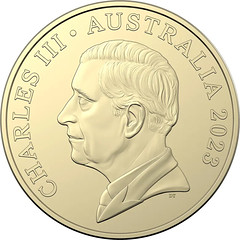 The Royal Australian Mint in Canberra has unveiled the new effigy of King Charles III that will appear on $1 coins before Christmas.
The Royal Australian Mint in Canberra has unveiled the new effigy of King Charles III that will appear on $1 coins before Christmas.
Since 1953, every Australian coin has featured Queen Elizabeth II, with the late monarch's coins remaining in circulation as legal currency.
From the end of this year, coins will begin bearing the image of King Charles III, and will feature some slight differences.
AUSTRALIA FIREFIGHTER COIN BULLSEYE ERROR
An error on Australia's 2020 $2 Firefighter coin makes it look like Her Majesty is being shot in the head. -Editor
Australia's 2020 $2 Firefighter coin was designed to be a collectable, but an error on the obverse side has made some even more so.
The coins were released in the aftermath of the Black Summer to commemorate the brave firefighters who battled bushfires across Australia, nine of whom died.
On the tails side, it features a male and female firefighter standing back to back as they wield their hoses against flames. A vivid, orange and yellow fireball sits in the middle.
BRITISH MUSEUM SEEKS RECOVERY OF STOLEN ITEMS
Leon Saryan passed along this article about new web pages set up by the British Museum as it seeks to recover stolen pieces from its collection. Thanks. -Editor
The British Museum has launched a new section of its website dedicated to the recovery of 2,000 items that were stolen from its collection. Launching the public appeal today, the museum invites anyone who is concerned that [they] may be, or have been, in possession
of the missing objects to get in touch by email.
FRENCH COUPLE SUES DEALER
While non-numismatic, this story from France illustrates a contentious issue that often surfaces when a dealer's profit becomes public. -Editor
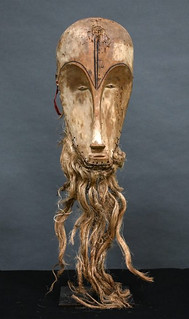 A legal case making its way through the French court system is raising questions about whether a person who has sold an artwork or artifact later determined to have a much higher value can seek further compensation.
A legal case making its way through the French court system is raising questions about whether a person who has sold an artwork or artifact later determined to have a much higher value can seek further compensation.
An unnamed 81-year-old woman and her 88-year-old husband came across an African mask while clearing out their second home. While most of the contents of the home went into a garage sale, they decided to sell the mask to a local antiques dealer, who agreed to buy the mask for €150, or about $157, in September 2021.
Months later, they discovered through reading the newspaper that their mask had just made €4.2 million ($4.4 million) at a specialized auction in Montpellier. As it turned out, it was a rare Fang mask used in rituals in an African secret society. The object was brought back from Gabon by the husband's grandfather, who had been a colonial governer in Africa in the early 20th century.
LOOSE CHANGE: OCTOBER 8, 2023
Here are some additional items in the media this week that may be of interest. -Editor
Pu Yi Wedding Type20 Cents
Here's a more harmonious example of a dealer discovering a seller's treasure. -Editor
Several times a week the Boston Gallery gets calls regarding world coins that people inherited from parents or grandparents acquired during travels in the past. Usually these accumulations comprise demonetized coinage often commonly traded as world poundage in the industry. There are a few instances when some silver coins are picked out of the lots. And then there was this exception.
A few weeks ago, a woman called and stated that she and her siblings inherited an accumulation of world coins and inquired if we would give her a valuation and an offer to purchase the coins. We scheduled an appointment to review her coins and give her an offer to purchase. When she came in, we found the collection to be better than the average accumulation of world coins that comes through the gallery. It contained many common silver coins circulated in different parts of the world and, hidden among them was a high-grade silver coin from China.
I informed the woman that she has a China, Year 15 (1926) Tientsin Mint Pu Yi Wedding Type
20 cents in high-quality condition and recommended she consign it to one of our signature auctions. This is a popular China type coin among collectors because it features the old emblem of China (the Twelve Symbol national emblem from 1912 to 1928) consisting of a dragon and a phoenix (or a peacock) holding sacrificial cups over an axe head on the obverse. The reverse features the value in Chinese within a wreath with the year and fractional denomination of the coin written in Chinese. The woman agreed with my recommendation of grading this coin and then selling it in one of our auctions. This coin was submitted to PCGS for grading and received a Mint State 62 designation. It is featured as lot 32433 in our October 2023 Hong Kong Auction.
To read the complete lot description, see:
CHINA. 20 Cents, Year 15 (1926). Tientsin Mint. PCGS MS-62.
(https://auctions.stacksbowers.com/lots/view/3-15CTLW/china-20-cents-year-15-1926-tientsin-mint-pcgs-ms-62)
To read the complete article, see:
IT ONLY TAKES ONE…
(https://stacksbowers.com/it-only-takes-one/)
Other topics this week include a messy McDonald's patron, and the coin Hobby versus Industry. -Editor
FEATURED WEBSITE: CAMP MONEY NOTES
This week's Featured Web Site is Dave Frank's Camp Money Notes. Found via News & Notes from the Society of Paper Money Collectors (Volume IX, Number 16, October 3, 2023).
The ultimate comprehensive resource for 20th Century camp money
What is Camp Money?
Two innocuous words that describe the currency of the many kinds of prison camps that held military and civilian captives during World War I and II.
The history and understanding of camp money is a field that is unfamiliar to the numismatic community as well as the general public. The purpose of this site is to present much of what is currently known about this elusive topic and to stimulate further discovery and research into this obscure subject of the 20th Century.

